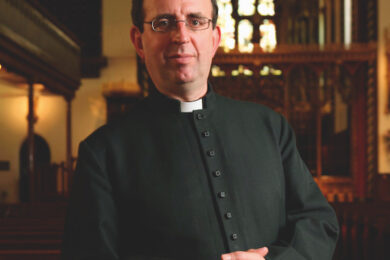Warm and wise in equal measure, Richard Coles is best known for his TV and radio celebrity as well as his former pop career, but it’s as vicar of St Mary The Virgin in the Northamptonshire parish of Finedon where his true life really exists. This existence was devastated in late 2019 by the death of his beloved life partner, David. Following his hugely popular memoirs Fathomless Riches and Bringing In The Sheaves, Coles’ new book The Madness Of Grief is a poignant account of losing David and the spiralling trauma of bereavement, but heartened with Coles’ black humour and compassion. Although not a self-help book, the homilies, experience and catharsis within creates invaluable solace. It will resonate for the myriad struggling with grief wrought by the pandemic.
A precocious musician, Coles began learning to play piano at the age of just four and was a choirboy at the age of eight. After turning 16, he came out to his mum by playing her Tom Robinson’s ‘Glad To Gay’ multiple times. Just a year later, he was diagnosed with clinical depression after a suicide attempt which prompted a spell in a psychiatric hospital. Released and then buoyed by his personal freedom from small town England, the eventual lure of London saw Richard immerse himself in the excitement of the capital’s thriving early 80s gay scene.
After becoming friends with Jimmy Somerville and joining Bronski Beat on sax after the band’s initial success, they both quit in 1985 to form The Communards. Their self-titled debut album contained the spectacularly successful hi-NRG version of disco classic ‘Don’t Leave Me This Way’, a cover that’s now synonymous with the era’s gloriously loud and proud gay liberation movement. The songs – ‘Victims’ and ‘For A Friend’ particularly – of the second equally vibrant but more thoughtful album Red chronicled the grim onset of AIDS. Following the band’s split in 1988, Richard studied for a BA in theology. Selected for Church of England priesthood training, he was ultimately ordained in 2005.
As his impressively eclectic and diverse song choices suggest, Coles’ love of music has been a reliable constant throughout his life. “The one thing through the past year that hasn’t paled for me is music,” he says, reflecting on his grief following David’s death. “I couldn’t read for a long time after he died. I couldn’t even get into box sets particularly, but the one thing that kept delivering for me was music.”
The Madness of Grief: A Memoir of Love and Loss by The Reverend Richard Coles is out now, published by W&N. To begin reading his selections, please click the pic below.



